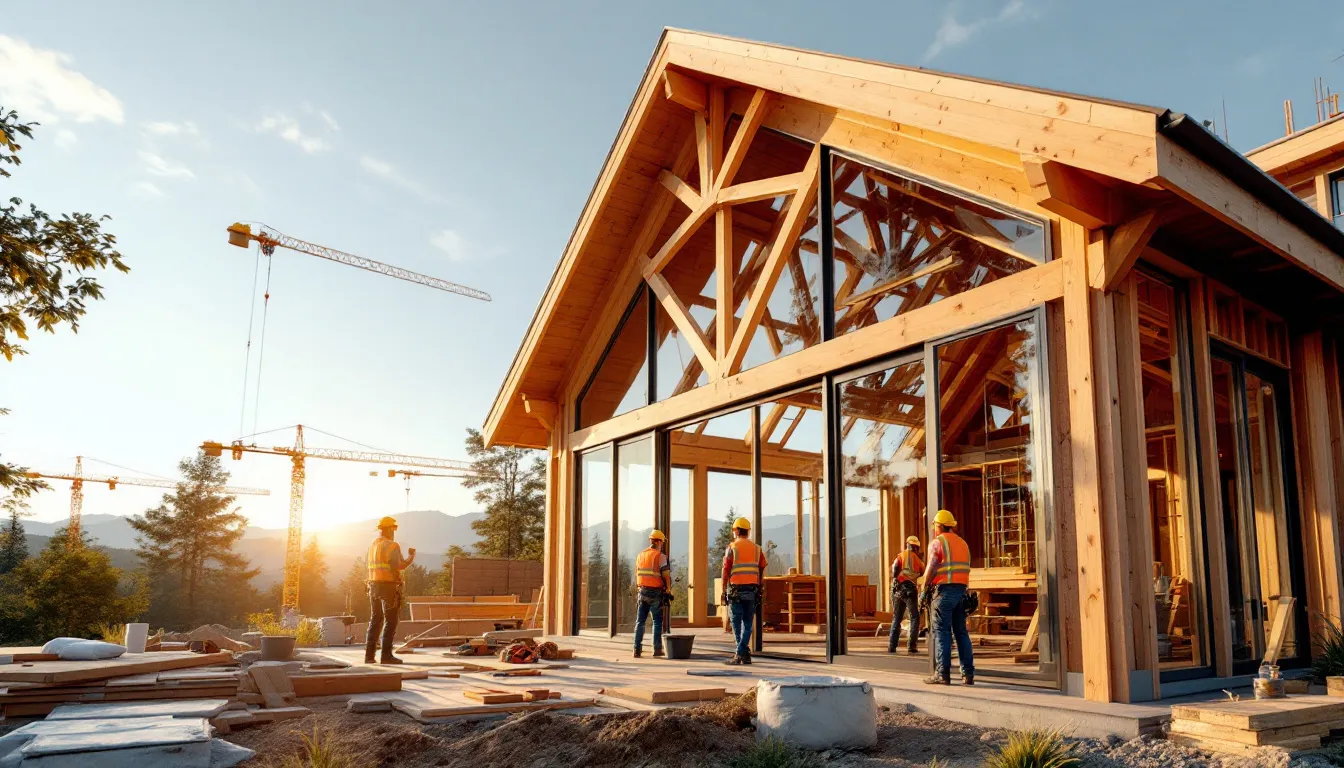Need professional help with your project?
Get quotes from top-rated pros.

Building a home addition can transform your living space and add value to your property. When it comes to who builds home additions, you have several options: home addition specialists, general contractors, and teams of construction professionals. While each can handle the job, home addition specialists are often the best choice because they offer specialized expertise, better cost management, and comprehensive project handling from start to finish.
They typically manage everything from design and permits to construction and finishing touches, eliminating the need to coordinate multiple contractors. Before starting your project, understanding your options will help you make the best choice for your home addition needs.
When planning to transform your existing home with more functional space, it’s crucial to understand the different professionals who can help bring your dream home to life. Each type of professional plays a specific role in home addition projects, from initial design to final walk through. Most homeowners need to work with several experts to complete their home addition project successfully.
Home addition specialists are professionals who focus exclusively on creating new space in existing homes. They handle popular home additions like master bedrooms, in-law suites, or kitchen space expansions. These experts manage the entire process from design-build to completion, coordinating all aspects of construction. They can transform available space into functional areas like game rooms, guest bedrooms, or walk-in closets. Their build team typically handles everything from foundation work to final finishing touches.
General contractors oversee home remodeling projects and work closely with various subcontractors. They coordinate room additions, bump outs, and second story additions. While they can handle most home addition services, they often need to hire specialized professionals for specific tasks. Most cases involve them managing the overall project timeline, budget, and quality control. They create detailed plans for transforming your space and ensure all necessary permits are obtained.
Architects and designers are essential for planning how your new addition will integrate with your existing home. They focus on maximizing square footage while maintaining your home’s aesthetic value. These professionals create detailed blueprints that consider factors like natural light, storage solutions, and space optimization. They help determine the best layout for your growing family’s needs and ensure the new addition complements your property’s architecture.
Specialized trade professionals handle critical systems in your home addition project. They ensure your new space has proper electrical wiring, plumbing connections, and heating/cooling systems. These experts work within building codes and safety regulations to create a fully functional space.
Selecting the right professional for your home addition can make the difference between a smooth project and a challenging one. Home addition specialists offer comprehensive services that can be more cost-effective than hiring multiple contractors separately.
Home addition specialists bring focused expertise to your project. Their experience with similar projects helps them anticipate and prevent common issues. They understand how to maximize square footage and create extra storage while maintaining your home’s flow. Their specialized knowledge ensures quality construction that adds value to your property.
Working with specialists often proves more affordable in the long run. They maintain relationships with suppliers, helping secure better material prices. Their experience helps avoid costly mistakes and change orders. They can suggest cost-effective alternatives without compromising quality, helping homeowners stay within budget while achieving their dream space.
Specialists typically complete projects more efficiently than general contractors. Their dedicated teams work consistently on your project, reducing delays. They coordinate all aspects of construction, from foundation to final details, ensuring smooth transitions between phases. This focused approach helps deliver your new addition on schedule.
Home addition specialists stay current with local building codes and permit requirements. They handle all necessary permits and inspections, ensuring your project meets legal requirements. Their familiarity with the approval process helps avoid delays and complications, making the entire process smoother for homeowners.
Understanding the process of building a home addition helps homeowners prepare for each phase of construction. Whether you’re adding more space for a family member or expanding your garage, knowing what to expect makes the journey smoother. Home addition contractors proudly serve clients by following a structured approach that ensures quality results.
Understanding the financial aspects of home additions helps you plan effectively. Costs vary based on the type and size of the addition, with most popular home additions having different price points.
| Type of Addition | Average Cost Range |
| Bathroom Addition | $18,000-$45,000 |
| Garage Addition | $35,000-$70,000 |
| Room Addition | $25,000-$75,000 |
| Second Story | $85,000-$200,000 |
Labor typically accounts for 40-60% of the total project cost, while materials make up the remainder. Costs vary based on your location and chosen materials.
Additional expenses may include:
Most home additions provide a 50-75% return on investment. Bathroom additions and garage expansions typically offer the best value, while specialized rooms may have lower returns. The actual return depends on your local real estate market and the quality of construction.
Selecting and working with the right professionals can make or break your home addition project. A successful partnership requires clear communication, proper documentation, and mutual understanding of project goals and expectations.
Start by researching local professionals with experience in similar projects. Look for contractors with proper licensing, insurance, and a solid portfolio of completed work. Check references, read reviews, and verify their experience with projects similar to yours. Consider their communication style and responsiveness during initial conversations.
Key questions to discuss:
Your contract should clearly outline:
Create a realistic timeline with your contractor that includes buffer time for unexpected delays. Regular progress meetings help keep the project on track. Document all changes and decisions in writing to maintain clear communication throughout the project.
Understanding common pitfalls can help you avoid costly mistakes and ensure your project runs smoothly. Many issues can be prevented with proper planning and professional guidance.
Planning and Design Mistakes
Financial pitfalls to avoid:
Common hiring mistakes:
Critical legal considerations: